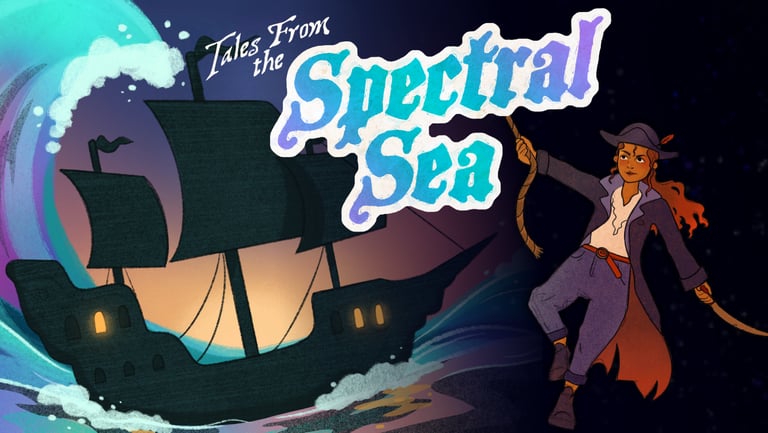
Tales From The Spectral Sea - Beyond Five Minutes Transcript
The transcript for Episode 4 of Beyond Five Minutes: Tales From The Spectral Sea from Sam Armstrong.
BEYOND FIVE MINUTESTTRPGS
Daniel Copper
8/21/20255 min read



A thumbnail image for Tales From The Spectral Sea by Sam Armstrong, with art by Amy Willis.



Transcript
DANIEL COPPER: Welcome to Beyond Five Minutes, where we delve a little deeper into the games discussed in Five Minutes, Not 5e. My name is Daniel, otherwise known as The Copper Compendium, and I’ll be your host. On this episode, we’re expanding on my chat with Sam Armstrong about Tales From The Spectral Sea.
Let’s begin with a question about the session-to-session gameplay: Tales From The Spectral Sea uses moves, a gameplay feature that comes up frequently in a wide variety of games, but that many of those listening might not have come across. What is a move, and how do the moves in Tales From The Spectral Sea reinforce the themes of the game?
SAM ARMSTRONG: So rather than traditional games, which use a generic skill check for almost any scenario, games which use moves take a set of scenarios that are most relevant to the theme and tone of the game and create a loose framework for exactly how to play them out in game. These are usually pretty flexible but the best sets of moves are there to gently guide the players to tell a certain kind of story. [In] Spectral Sea it takes this a step further by adding a pair of questions to every move — you don’t need to answer “yes” to these, but doing so gives you +1 to- to the dice result. This means that to play optimally you need to constantly be playing like a swashbuckling hero, and not taking the bonuses can still sometimes be a really fun and dramatic decision.
DANIEL: I really appreciated the dual aspects each character has, represented by their two playbooks. What do these playbooks represent, and how do these two aspects allow characters to shine?
SAM: Of the 12 playbooks included in the game, 6 are descriptors and 6 are roles. A descriptor is an adjective that describes your character’s personality: for example, you might be stormy or wild. A role instead describes your job on the crew: for example, you might be a topman or even the captain. When you build your character, you pick one of each of these and gain an ability from both. This means you have one of 36 combinations like the Smooth Captain or the Wild Scoundrel. Each playbook also has its own question, one that you can use with every move, once again meaning that to power-game your rolls you need to role-play into your trope. A Smooth Topman, for example, gains +1 to their rolls if they’re cool and collected regardless of the stress they’re under, or simply if they’re somewhere up high.
DANIEL: Many people will be familiar with games, including video games, that use hit points to signify a character’s health. Tales From The Spectral Sea doesn’t do that, leaning on conditions instead. Could you talk a bit about what they entail, and why you decided to go that route in your design?
SAM: Hit points work very well in more mechanical games to let you know how many poor decisions or dice rolls you can take before something bad actually happens. This works because in those games failure is seen as something you should avoid at all costs. In Spectral Sea I want people to be excited when they fail because it opens up new story paths and gives them a chance to succeed later, after facing adversity. To that end, every time you mark a condition, your character changes in some way until it’s cleared.
A great example is when the Duellist becomes vengeful. This actually makes them better at overcoming obstacles with brute strength, but much worse if they need to notice something out of place. As you mark more conditions, you’ll also run the risk of triggering a reality meltdown. This is when your worst fears or regrets begin to physically manifest around you and you lose control of your character until one of your allies can talk you back down. Hopefully you can see how from all of this, marking conditions can turn a failed roll into one of the best moments of your campaign.
DANIEL: Characters in this game can either die or move on. How might each happen, and how do they differ?
SAM: One key theme I wanted to reinforce through the mechanics is that you aren’t meant to be here for long. You’re supposed to be confronting your trauma and moving on. Once you’re ready to level up you’re expected to track down the spectre of your manifestation [of your trauma] and face it head on. Once you’ve done this enough your character makes a tearful goodbye and leaves the campaign once and for all.
But what if you don’t wanna go? Well you can fight it, you can actively try to avoid levelling up, perhaps by not playing into your role, not saying goodbye when others pass on, or even just acting more violently. As well as behaving exactly like someone who isn’t ready to accept they’re dead, you also run the risk of dying… again. Whenever the GM [Game Master] is feeling mean you might make a death roll. This probably won’t kill you at first, but like with conditions, they always result in something dramatic changing about your character. On top of that, each one can only happen once. This means that as you get more and more lucky breaks, you know that next time it- it is more likely that your luck will run out.
DANIEL: Thank you again, Sam, for chatting with me about Tales From The Spectral Sea! Where can people find you, and your games?
SAM: The best place to go is armstronggames.carrd.co – carrd with two Rs for some reason. From there you’ll find links to my socials, my itch store for PDFs, my ko-fi store for physical games and my free Patreon for regular updates on what I’m working on.
DANIEL: You can find those links, as well as links to the transcript of this episode, and links to the game, in the video description [below, here]. If you want to find games with similar themes or gameplay to this one, there will also be links to relevant playlists.
And that brings us to the end of the expanded interview! Beyond Five Minutes is an expansion of Five Minutes, Not 5e, so if you’ve not heard my previous discussion with Sam about the game, you can find it linked in the end screen and description. Thank you for listening, until next time!
[End of transcript.]

Links
The Game and its Designer
Get the game (digital copy): https://sam-armstrong.itch.io/spectral-sea
Get the game (physical copy): https://ko-fi.com/s/531c7dfabc
Check out Sam's games on itch.io: https://sam-armstrong.itch.io/
Find all of Sam's links: https://armstronggames.carrd.co/
Follow Sam on Bluesky: https://bsky.app/profile/samarmstronggames.bsky.social
Relevant (YouTube) Links
Tales From The Spectral Sea - Five Minutes, Not 5e: https://youtu.be/6rWk03_RaZg
Tales From The Spectral Sea - Five Minutes, Not 5e Transcript: https://thecoppercompendium.co.uk/tales-from-the-spectral-sea-five-minutes-not-5e-transcript
Fantasy: https://www.youtube.com/playlist?list=PLsLJ-CI8A8CB5da-uZlVR0f30SLGm7OIB
Nautical: https://www.youtube.com/playlist?list=PLsLJ-CI8A8CDwOGzlY2fNGjYTsyEnUznS

